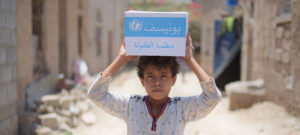 During a high-level event at UN Headquarters in New York, chaired by UN humanitarian chief Mark Lowcock, officials of the humanitarian and donor communities exchanged views on the scale of the need, what has been accomplished so far, and the roadblocks which remain across Yemen.
During a high-level event at UN Headquarters in New York, chaired by UN humanitarian chief Mark Lowcock, officials of the humanitarian and donor communities exchanged views on the scale of the need, what has been accomplished so far, and the roadblocks which remain across Yemen.
The event started with the UN Humanitarian Coordinator Lise Grande stating that “there is no other place in the world where people are suffering so greatly”.
The unprecedented scope and depth of the crisis in Yemen, now in its fourth year, has been repeatedly reported: three-quarters of the population require some form of basic assistance to survive; over 2 million internally displaced; 16 million in need of medical help. The figures are near-impossible to grasp.
The Humanitarian Coordinator painted a concrete picture: “One child is dying every 10 minutes because of the conflict… 70 per cent of girls are being married before 18 as a coping strategy… 8.3 million people have absolutely no idea when they wake up in the morning where their meal will come from… one in four Yemenis are malnourished…”
She also explained that the country’s currency, the Yemeni Rial, has depreciated by 300 per cent compared to pre-crisis rates. “If the depreciation continues, we believe 12 million people could be at risk of starvation”, she stressed.
Conflict in Yemen – already one of the poorest countries in the world before the crisis – escalated in March 2015, when an international coalition led by Saudi Arabia intervened militarily at the request of the Yemeni presidency. Airstrikes and ground-fighting have become a daily occurrence for millions of civilians. “It is officially estimated that 16,000 people have been killed,” said Ms. Grande. “The real numbers are probably a lot higher,” she added.
Hundreds of thousands of families no longer have a regular source of income – including teachers, health workers, water and sanitation workers and other public servants. They have not been paid a regular salary in two years.
The Humanitarian Coordinator noted that the situation is particularly desperate in Hudaydah, an opposition-held governorate in western Yemen, where “vulnerability levels” are the worst and where, in the past three months alone, half a million people have been forced to flee their homes.
According to the UN Office for the Coordination of Humanitarian Affairs (OCHA), organizer of the event, impediments to humanitarian action include movement restrictions, attempted interference and harassment, fluctuating commercial import levels, and collapsing basic health, education, water and sanitation services.
Ms. Grande who hailed as unprecedented the response of humanitarian organizations listed three priorities for these organizations: reduce hunger and roll back malnutrition; prevent another cholera outbreak; and protect civilians at any cost.
She also provided the international community with a long list of requirements, topped by the need for the warring parties to stop fighting. “Humanitarians cannot solve the conflict in Yemen, only politicians can,” she stated.
Closing the event, the United Kingdom, Canada Kuwait, the USA and Denmark pledged their continued support to the international response to the Yemen crisis.
